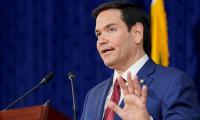ISLAMABAD: Prime Minister Imran Khan said on Thursday that the decision to impose lockdown in the country to combat the coronavirus pandemic was taken by the elite without thinking of the poor.
He talked of striking a balance between the lockdown to save people from falling prey to the virus and ensuring the poor and the needy did not face hunger and this could not be achieved by locking down the country without taking care of the weak segments of the society.
Speaking at COMSTECH headquarters here at a ceremony regarding the production of ventilators, sanitizers, safety kits, testing kits and masks, the prime minister maintained that India even went a step ahead when Narendra Modi turned out to be so timid that he locked down India at once, compounding the common man’s problems there.
He emphasised that the ruling elite in the past was so impressed by the West that they suffered from a dependency syndrome (DS), allowing everything to be imported having no self-belief, which the Holy Prophet (PBUH) had inculcated while establishing the state of Madina, doing away with mental slavery.
The prime minister regretted that no attention was paid and investment in knowledge economy and the result was lack of self-belief. He said this resulted in so many Pakistanis going abroad and they all excelled on finding enabling environment there. “However, back home, merit was never upheld. If they can excel abroad, why can’t they here,” he remarked.
The prime minister noted that the virus had brought forward two-three things and one was that Pakistan was in need of ventilators and other related stuff and could not a country, capable of nuclear weapons, make masks and ventilators. He emphasised that the government would be moving towards the knowledge economy and promotion of science and technology.
The prime minister made mention of the ruling elite, which suffered from the dependency syndrome but even for cough, they would go abroad for test and treatment and even their other family members on the taxpayers’ money, but today they could not because there was greater risk abroad.
However, he said, while the ruling elite got treated abroad, the government hospitals were left for the common man and their services deteriorated over the years and these were to be revamped and infrastructure developed. He added that for this, people like him and the ministers would have to seek treatment at government hospitals in the country. The prime minister said he and his sisters were born at government hospitals. He said health infrastructure in the country will have to be improved.
The prime minister was of the view that self-belief was panacea for development, progress and self-reliance. “We have to go towards knowledge economy, education, science and technology to get a dignified place in the comity of nations,” he said.
He emphasised that the virus had shown that it affected everyone, both the rich and the poor, and the elite took the decision of imposing the lockdown without caring about the poor, who, if suffered, could come out for livelihood and cause its spread in the rich areas.
“It has shown us that if we don’t pay attention on the poor, then the virus would spread to posh localities. It is regrettable that the ruling elite in the past was so impressed by the West that they never thought that Pakistan could also develop itself, as it had been in 1960s due to self-belief,” he maintained.
Imran Khan pointed out that the COVID-19 crisis provided an opportunity to produce locally manufactured ventilators and other protective equipment as everything could not be imported. He added that the self-belief would give great help, as the nation had great potential to excel. The prime minister noted that a pool of professionals was abroad, which would like to return, but for this, first things would be rectified.
The prime minister said the government spent one and a half year, exploiting resources to deal with the unprecedented economic crisis and now it would try to thrash out both mid-term and long-term policies based on a vision to lift also people from poverty. During the presentation in China, he said, they were told of how effective had been their long-term policies to take 700 million people from poverty. He maintained that there was a connection between the defence production and the private sector in the United States with regards to the innovations and latest technologies, which did not exist in Pakistan.
The prime minister appreciated Minister for Science and Technology Fawad Chaudhry for his refreshing mindset to make use of the dormant potential of his ministry.
Earlier, Fawad Chaudhry while briefing the prime minister said Pakistan was producing the personal protective equipment (PPE) indigenously on affordable cost to face the challenge of COVID-19.
The minister said his ministry’s Pakistan Council of Scientific and Industrial Research (PCSIR) was manufacturing hand sanitisers and disinfectants in large number and these could be exported after meeting the local requirements. He said seven types of ventilators designed by the Pakistan Engineering Council were in clinical trial, while the National University of Science and Technology had developed its own testing kit, adding in next few weeks, ventilators would be produced locally.
Fawad Chaudhry noted that private sector, especially textile sector of Faisalabad, was producing protective gears for doctors and heal workers, beyond our domestic consumption.
Minister of Defence Production Zobaida Jalal said Pakistanis had great mind and were capable of overcoming any kind of challenge. She added that after emergence of the COVID-19, teams working under Ministry of Defence Production were mobilised to prepare safety equipment in fight against coronavirus.
Zobaida Jalal noted that her ministry had achieved the capability to produce around 300,000 to 400,000 litres of sanitizers, 35,000 high quality masks and 400-500 protective suits per day.
She continued that production along with its establishments had stepped forward to complement the ongoing national fight against the virus and work out methodologies of utilising existing industrial infrastructure for development of protective gears and other articles.
“We made possible all the production with our own resources. In this regard, NRCC utilised Rs10 million from its own resources,” she said.
The minister explained that NRCC would start repairing of ventilators in Haripur and Lahore soon to meet any kind of emergency, whereas 300 ventilators had so far been repaired by our engineers. She spoke highly for engineers for their contribution towards combating the virus.
Meanwhile, Imran Khan said Pakistan's situation in terms of coronavirus and related response is "much better" than the other countries.
The prime minister said the real number of coronavirus cases in Pakistan is less than the projected one as of April 30. "We imposed a lockdown when we had 26 cases and the public also cooperated with us. When you compare Pakistan to other countries, then our situation is much better. We were assuming that our hospitals would be full by now but then our situation is much better," he said.
The premier said he spoke to Hassan Rouhani and Abdel Fattah el-Sisi, the Iranian and Egyptian presidents, respectively.
"Iran has now decided to close large gatherings such as weddings and schools and open up all businesses," the PM said. "They also fear that their losses due to unemployment are bigger than that from the coronavirus," the premier said.
The Cairo leadership, he said, "decided on the first day to lock down large gatherings but they tried to make sure the construction sector remained working".
"Egypt's and our tally is the same and their economic condition is similar to ours. Our lockdown was much stricter than them but the deaths remained the same. We decided to share both our experiences in the future," Imran Khan said, noting that his team of ministers knew that daily wagers, labourers, waiters, and taxi drivers would be the worst-affected of all.
"I would like to congratulate Dr Sania (Nishtar) for the Ehsaas (Emergency Cash) Programme. It is a proud moment for us," he said.
The prime minister explained that the money disbursed to deserving people was based on relevant data and not political affiliations. Sindh, he noted, received the highest number of payments under the Ehsaas Programme.
"I was very happy to see that the lowest strata of society could get the money. We have so far distributed Rs81 billion," he said. He said the Corona Relief Programme is being merged into Ehsaas Programme.
"The second programme we are starting... I had decided to keep the money (that was) gathered from the relief fund for the unemployed," he added, noting that an SMS campaign would be launched soon and that the new project to support people out of jobs would require proof of unemployment -- a plan the government was working on.
"For every rupee donated, the government will match it with Rs4 in the fund," the premier said, adding that the 'Corona Relief Tigers Force' had been informed to set up a desk in each union council to check who has been unemployed.
"There are many white-collar workers who have been unemployed and who will not come forward," he said. "We will use the Imams of mosques to know who the unemployed people are,” he said.
"We will provide (assistance to) them under the fund," he stated, before expressing his gratitude to Industries and Production Minister Hammad Azhar for launching a programme for the small and medium-sized enterprises (SMEs).
With regard to the overseas Pakistanis stranded abroad due to international flights disrupted over coronavirus pandemic, Imran Khan said he understood that they wished to return home.
"I have instructed Moeed (Yusuf) to give all the details and tell the difficulties in bringing them back," he said, referring to his Special Assistant on National Security Division and Strategic Policy Planning.
"Overseas Pakistanis are our biggest asset," he noted. "It is our responsibility to take care of them and I have instructed our embassies to take care of them," he said.
The PM, however, added that he was aware of the pressure on the embassies.
Imran Khan said his focal person on coronavirus Dr Faisal Sultan was tasked to coordinate with the doctors and provinces, explaining that "our policy is made on the analysis they share" and the National Command and Operation Centre (NCOC) took that into account before moving ahead.
He said he recently learnt that different Pakistani industries had started making ventilators at a very cheap price. "We are thinking of exporting those items," he said.
The wide-ranging discussion between the prime minister and Egyptian president focused on their respective national approaches to managing COVID-19 and Prime Minister Imran Khan’s call to launch a ‘Global Initiative on Debt Relief’ for developing countries.
The prime minister congratulated President Sisi for pursuing an effective national strategy. He also highlighted the key elements of Pakistan’s approach aimed at saving lives from the scourge of the virus and protecting the most vulnerable segments of population from acute economic distress.
On the issue of debt, the prime minister underscored that while debt suspension will help free up resources in the developing countries to manage this unprecedented global health and economic crisis, where people are facing a stark choice-death by COVID-19 or by hunger-more measures were needed to reboot the developing countries’ economies.
President Sisi expressed support for the Prime Minister’s Debt Relief Initiative. The prime minister stressed the importance of working together to evolve a comprehensive plan to turn this crisis generated by global pandemic into an opportunity for economic regeneration.
The two leaders reaffirmed their commitment to further solidify the close fraternal ties between Pakistan and Egypt.
Imran Khan reiterated his invitation to President Sisi to visit Pakistan at the earliest convenience.
Meanwhile, Prime Minister Imran Khan said that the government of Indian Prime Minister Narendra Modi was committing war crimes in Indian Occupied Kashmir (IOK) under the cover of the virus pandemic.
In a statement on social networking platform Twitter, the premier said that India was violating the Fourth Geneva Convention by continuing the genocide of the people of Occupied Kashmir.
"Under cover of COVID19 global pandemic, the Modi govt with its fascist Hindutva Supremacist RSS-driven ideology continues its war crimes in IOJK," he said in his message on Twitter.
"...as it violates the Fourth Geneva Convention by continuing its genocide of Kashmiris: & by attempting to change the demography in Occupied Jammu & Kashmir," he added.
Imran Khan said that occupied Kashmir was recognised as a disputed territory by the United Nations and the international community had a responsibility to take note of Indian war crimes there.
"...a territory recognised as disputed by UN. The international community has a responsibility to take note of & act against these war crimes by India in violations of 4th Geneva Convention & int humanitarian laws."
Five passengers were taken down from bus and killed in execution style, Rehman said
Petition names federal government, Senate chairman, National Assembly Speaker and ECP as respondents
Petition stated that hearings were previously postponed on February 27 and March 11 without justification
Five men one Afghan and four Pakistanis were sentenced on Tuesday in Rawalpindi
Ministry of Law and Justice has issued formal notification of these appointments after approval of federal cabinet
Railway minister said Bolan Mail, which was running twice week between Quetta and Karachi, will now be run on daily...







